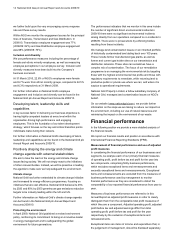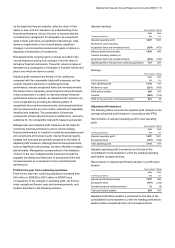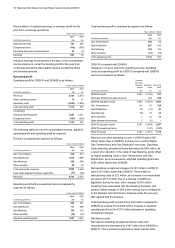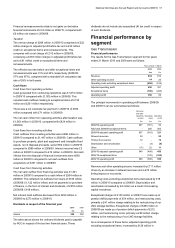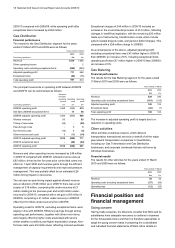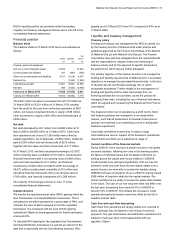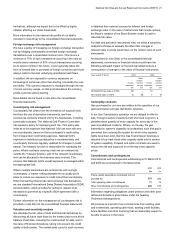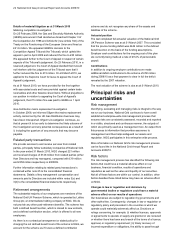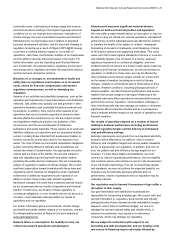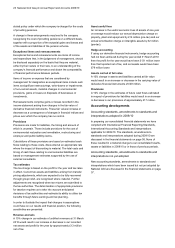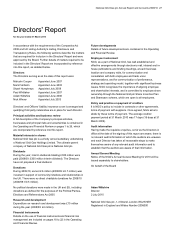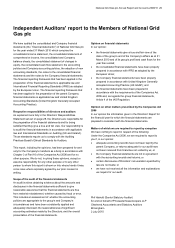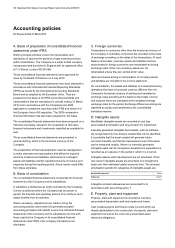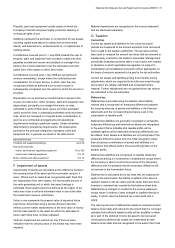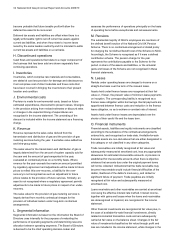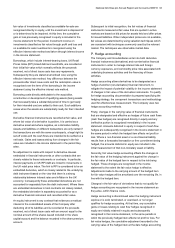National Grid 2010 Annual Report Download - page 25
Download and view the complete annual report
Please find page 25 of the 2010 National Grid annual report below. You can navigate through the pages in the report by either clicking on the pages listed below, or by using the keyword search tool below to find specific information within the annual report.
National Grid Gas plc Annual Report and Accounts 2009/10 23
commodity costs, a decoupling of energy usage and revenue
and other decisions relating to the impact of general economic
conditions on us, our markets and customers, implications of
climate change, the level of permitted revenues and dividend
distributions for our businesses and in relation to proposed
business development activities; and (iii) structural changes in
regulation (including as a result of Ofgem’s RPI-X@20 review),
could have a material adverse impact on our results of
operations, cash flows, the financial condition of our businesses
and the ability to develop those businesses in the future. For
further information, see the Operating and Financial Review
and, in particular, the external market, regulatory environment
and energy policy, regulatory and other developments sections
and the business description sections.
Breaches of, or changes in, environmental or health and
safety laws or regulations could expose us to increased
costs, claims for financial compensation and adverse
regulatory consequences, as well as damaging our
reputation.
Aspects of our activities are potentially dangerous, such as the
operation and maintenance of gas transmission and distribution
networks. Gas utilities also typically use and generate in their
operations hazardous and potentially hazardous products and
by-products. In addition, there may be other aspects of our
operations that are not currently regarded or proved to have
adverse effects but could become so. We are subject to laws
and regulations relating to pollution, the protection of the
environment, and the use and disposal of hazardous
substances and waste materials. These expose us to costs and
liabilities relating to our operations and our properties whether
current, including those inherited from predecessor bodies, or
formerly owned by us and sites used for the disposal of our
waste. The cost of future environmental remediation obligations
is often inherently difficult to estimate and uncertainties can
include the extent of contamination, the appropriate corrective
actions and our share of the liability. We are also subject to
laws and regulations governing health and safety matters
protecting the public and our employees. We are increasingly
subject to regulation in relation to climate change. We commit
significant expenditure toward complying with these laws and
regulations and to meeting our obligations under negotiated
settlements. If additional requirements are imposed or our
ability to recover these costs under relevant regulatory
framework changes, this could have a material adverse impact
on our businesses and our results of operations and financial
position. Furthermore, any breach of these regulatory or
contractual obligations, or even incidents that do not amount to
a breach, could materially adversely affect our results of
operations and our reputation.
For further information about environmental, climate change
and health and safety matters relating to our business, see the
Our Responsibility section of National Grid plc’s website at
www.nationalgrid.com.
Network failure or interruption, the inability to carry out
critical non-network operations and damage to
infrastructure may have significant material adverse
impacts on both our financial position and reputation.
We may suffer a major network failure or interruption or may not
be able to carry out critical non network operations. Operational
performance could be materially adversely affected by a failure
to maintain the health of the system or network, inadequate
forecasting of demand or inadequate record keeping or failure
of information systems and supporting technology. This could
cause us to fail to meet agreed standards of service or incentive
and reliability targets or be in breach of a licence, approval,
regulatory requirement or contractual obligation, and even
incidents that do not amount to a breach could result in adverse
regulatory and financial consequences, as well as harming our
reputation. In addition to these risks, we may be affected by
other potential events that are largely outside our control such
as the impact of weather (including as a result of climate
change), unlawful or unintentional acts of third parties or force
majeure. Weather conditions, including prolonged periods of
adverse weather, can affect financial performance and severe
weather that causes outages or damages infrastructure will
materially adversely affect operational and potentially business
performance and our reputation. Terrorist attack, sabotage or
other intentional acts may also damage our assets or otherwise
significantly affect corporate activities and as a consequence
have a material adverse impact on our results of operations and
financial condition.
Our results of operations depend on a number of factors
relating to business performance including performance
against regulatory targets and the delivery of anticipated
cost and efficiency savings.
Earnings maintenance and growth from our regulated electricity
business will be affected by our ability to meet or exceed
efficiency and integration targets and service quality standards
set by, or agreed with, our regulators. In addition, from time to
time, we publish cost and efficiency savings targets for our
business. To meet these targets and standards, we must
continue to improve operational performance, service reliability
and customer service and continue to invest in the development
of our information technology. If we do not meet these targets
and standards, we may not achieve the expected benefits, our
business may be materially adversely affected and our
performance, results of operations and our reputation may be
materially harmed.
Our reputation may be harmed if consumers of gas suffer a
disruption to their supply.
Our gas transmission and distribution businesses are
responsible for transporting available gas. We consult with, and
provide information to, regulators, governments and industry
participants about future demand and the availability of supply.
However, where there is insufficient supply, our role is to
manage the relevant network safely and reliably which, in
extreme circumstances, may require us to disconnect
consumers, which may damage our reputation.
We are subject to restrictions with respect to our
borrowing and debt arrangements, and our funding costs
and access to financing may be adversely affected by



